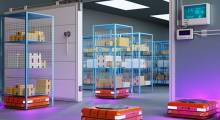Optomec is now offering integrated robotic automation for its Huffman line of production 3D Metal Additive Repair machines. The solution combines Optomec’s best-in-class Huffman line of production laser cladders together with a Fanuc LRMate 200, a compact, six-axis industrial robot with the approximate size and reach of a human arm.
This robotic integration automates the loading and unloading of parts into the chuck of the laser cladder, allowing the system to operate at even faster cycle times by working from trays and racks that contain a dozen or more components. Though the automation scheme is especially suited for high volume repair of turbine blades and vanes, it can be applied to a number of industrial applications such as the repair of sealing surfaces of diesel engine components, or the addition of hardfacing materials to industrial valve parts.
“Before automated laser cladding, the workflow for turbine blade repair was long and complicated. Optomec optimized the flow dramatically by combining vision systems, software and laser cladding into one hardened, production-grade process step. Now we are taking it one step further. Adding robotic part handling inside the machine really completes the automation for the process, freeing up the operator to add more value elsewhere in the workflow,” said Todd Lorich, Engineering Manager for Optomec’s Huffman line of automated laser cladders.
Certified for aviation repair in 15 countries, Optomec has delivered more laser cladding systems to OEMs and MROs than any other manufacturer. Optomec’s Huffman brand laser cladders have remanufactured more than 10,000,000 turbine components over the last 15 years.
Optomec’s 3D Metal Additive systems use Directed Energy Deposition (DED) - a form of metal 3D Printing that enables highly repeatable repairs of high value components and delivers superior metallurgy at a lower cost as compared to hand TIG-welded repairs.
The combination of the Huffman line of laser cladders with the Fanuc LRMate 200 and Optomec’s AutoCLADTM vision and adaptive process software takes automated laser cladding to the next level of throughput, making it ideal for high volume, high-accuracy, high-acceleration applications.
Sources: Press materials received from the company and additional information gleaned from the company’s website.
About the Author
Press releases may be sent to them via [email protected]. Follow Robotics 24/7 on Facebook
Follow Robotics 24/7 on Linkedin
Article topics
Email Sign Up















